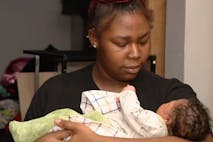
Christian college allows pro-life club after resolving 'misunderstanding'
Bridget Sielicki
·
Her mother’s dark secret and her own miscarriage cemented her compassion for women in crisis
Sixteen-year-old Clarissa Carruthers-Dodsworth was riding on the school bus one day when she met her soon-to-be boyfriend. He fell in love with her, but Carruthers-Dodsworth didn’t have reciprocal feelings for him. The couple became intimate and a year later, she discovered she was pregnant.
Carruthers-Dodsworth told Live Action News, “I didn’t even know I was pregnant. I thought it was the flu; I was in denial. But the nausea was unrelenting, making my mom suspicious. She took me to the nurse’s station at school where I found out I was expecting.”
Her mother presented her with two options: keep her baby or place the child for adoption. Abortion was never mentioned — and at the time, Carruthers-Dodsworth didn’t know about a secret her mother had been hiding.
“I wanted to keep my baby, so my mother took me to the obstetrician she worked for,” Carruthers-Dodsworth said. “While they didn’t accept my insurance, they agreed to take me as a patient me as a favor to my mom.”
As the pregnancy progressed, Carruthers-Dodsworth experienced several medical issues and was diagnosed as high-risk. “I was put on bed rest and told never to get pregnant again. The day I was scheduled for a Caesarian, my baby only weighed two pounds, so the surgery was re-scheduled,” said Carruthers-Dodsworth. “I lost so much blood that I kept passing out. It was a very challenging time.”
The dark secret comes to light
But seven years later, still with her boyfriend, Carruthers-Dodsworth again became pregnant. Her desire for her young daughter to have stability was instrumental in her decision to remain with him. But when he started selling drugs, she finally left.
“Luckily, my mom took care of my daughter while I attended college, which was a stipulation when I chose to raise my child,” Carruthers-Dodsworth said.
During this time, she and her mother became active with their parish’s pro-life ministry and participated in a rose procession to commemorate babies who perished through the years since Roe was instituted.
It was then that the secret her mother had been harboring came to light.
Carruthers-Dodsworth said, “When my mom was asked to stand in the procession for someone who was absent, she began crying. That’s when she told me about her unplanned pregnancy and that she was forced by her parents to have an abortion. She never wanted me to experience the same lifelong grief she had. It was an emotional moment for both of us. I think helping to raise my baby was therapeutic for her.”
A natural miscarriage provides a glimpse into the horror of chemical abortion
Years later, now married with seven children, six of whom were girls, Carruthers-Dodsworth was carrying her eighth child, hoping for a boy. Her pregnancy seemed to be progressing normally. But at 11 weeks, she went for an ultrasound, and she was informed she wasn’t as far along as she had estimated.
“I knew when I had gotten pregnant so that was confusing,” Carruthers-Dodsworth said. “When I went back a week later, I was told I had a subchorionic hematoma and not to lift anything.”
Article continues below
Dear Reader,
Have you ever wanted to share the miracle of human development with little ones? Live Action is proud to present the "Baby Olivia" board book, which presents the content of Live Action's "Baby Olivia" fetal development video in a fun, new format. It's perfect for helping little minds understand the complex and beautiful process of human development in the womb.
Receive our brand new Baby Olivia board book when you give a one-time gift of $30 or more (or begin a new monthly gift of $15 or more).
The following Sunday at church, she picked up both of her crying toddlers to take them out of the service. Afterward, she began spotting. A subsequent ultrasound two days later failed to detect the baby’s heartbeat. “It was heartbreaking. I had never lost a baby before and didn’t know what to expect,” she said. “I was told when my body began to expel my baby it would be like having a period.”
It took three days before she started to experience spotting and bleeding. She felt well enough to go to the grocery store — but while there, felt a sudden gush.
“I went into the bathroom while my son pushed the kids around the store in the cart,” Carruthers-Dodsworth said. “My two oldest daughters went with me. Everything seemed to come out at once. It looked like a murder scene with blood everywhere and my children handing me paper towels.”
As she instructed one of her daughters to get heavy duty sanitary pads, she felt a second rush of blood. “The toilet water turned black and there was blood spilled on the bathroom floor. I couldn’t get up without blood pouring out,” said Carruthers-Dodsworth. “Employees were coming in and out of the restroom. It was such a horrific time.”
She was eventually able to get home, and believed the worst was over. But then, as she drove her son to tutoring, she again felt ill.
“I drove to the library, which was the nearest place, because I had an urge to push while in the car,” Carruthers-Dodsworth said. “As I ran to the bathroom, we noticed a police officer standing nearby. When I expelled a huge blood clot, I asked my daughter to look for the baby and to ask the police officer for a bag for the baby’s remains.”
Carruthers-Dodsworth likened her experience to unsuspecting women who swallow the abortion pill without being fully informed of the sometimes severe after-effects. She said, “My mind kept going to the chemical abortion scene in the movie, ‘Unplanned.’ More women need to speak out about the pain of miscarriage and the ugliness of chemical abortions. I think it would deter women who think the abortion pill is the answer to unplanned pregnancies.”

“He could see the personhood”
Exhausted from losing so much blood, Carruthers-Dodsworth collapsed when trying to stand. When the ambulance arrived, she wanted to ensure her baby’s remains were handled properly.
Carruthers-Dodsworth said, “I needn’t have worried, because even the paramedic could see the personhood of the baby, who had visible eyes and mouth. He tenderly cared for him as if he was alive. In fact, when I woke up [during transport] to the hospital, I could see [the paramedic] had been crying.”
The man told her that he and his wife almost lost their baby, and that the experience “hit home” for him.
“He told me, ‘That could have been us. I am so glad I was here today to help you,’” Carruthers-Dodsworth said. “It was clear he was pro-life. I told him he does have a voice in the movement if he would use it.”
Carruthers-Dodsworth now has a deeper compassion for women who lose their babies to miscarriage, and women who are led to believe that chemical abortion is little more than a heavy period.
Live Action News is pro-life news and commentary from a pro-life perspective.
Contact editor@liveaction.org for questions, corrections, or if you are seeking permission to reprint any Live Action News content.
Guest Articles: To submit a guest article to Live Action News, email editor@liveaction.org with an attached Word document of 800-1000 words. Please also attach any photos relevant to your submission if applicable. If your submission is accepted for publication, you will be notified within three weeks. Guest articles are not compensated (see our Open License Agreement). Thank you for your interest in Live Action News!

Bridget Sielicki
·
Human Interest
Nancy Flanders
·
Human Interest
Nancy Flanders
·
Human Interest
Nancy Flanders
·
Pop Culture
Cassy Cooke
·
Human Interest
Cassy Cooke
·
Human Interest
Lisa Bast
·
Human Interest
Lisa Bast
·
Human Interest
Lisa Bast
·
Human Interest
Lisa Bast
·
Lisa Bast
·